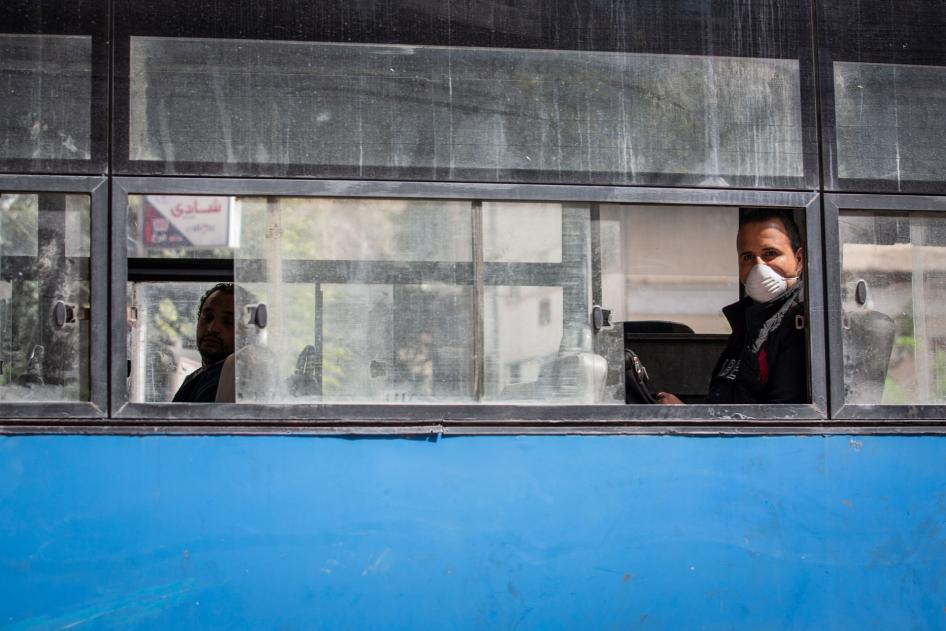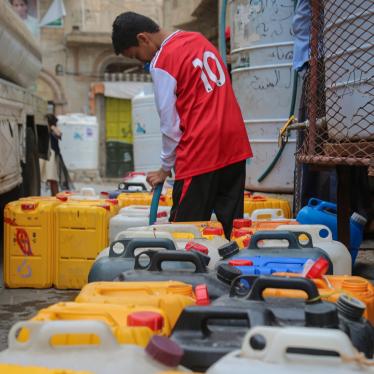(Beirut) – Egyptian authorities should ensure that people living with HIV can continue to safely access lifesaving medication, Human Rights Watch said today.
The government on March 9, 2020 designated the country’s fever hospitals, the only centers where people living with HIV can get this medication, as testing centers for Covid-19. Egyptians living with HIV told Human Rights Watch that they are “too fearful” to go there to get their medication for fear of contracting coronavirus.
“The government of Egypt should remove any obstacles to access to treatment for people living with HIV,” said Joe Stork, deputy Middle East and North Africa director at Human Rights Watch. “The government should ensure that people already facing health concerns can get their medication safely.”
People with underlying health conditions, including people who have compromised immune systems, have a higher risk of severe illness from Covid-19. The World Health Organization (WHO) has said there is no evidence to date that the risk of infection or complications of Covid-19 is different among people living with HIV who are clinically and immunologically stable on antiretroviral treatment compared with the general population.
However, those with advanced HIV, low count of infection-fighting CD4 cells, or who are not taking or have no access to antiretroviral treatment may have an increased risk of infections and health complications related to Covid-19. Egyptian authorities should establish alternative multi-month dispensing centers for people living with HIV to reduce hospital visits and minimize the chance for contracting coronavirus, Human Rights Watch said.
On March 9, the spokesperson for the Egyptian Cabinet announced that the fever hospitals across the country, responsible for treating infectious diseases, would receive people for the Covid-19 test and temporary quarantine. This includes the three fever hospitals in Cairo – the Imbaba, Abbassiya, and Helwan hospitals.
The government did not say how it would reduce any risk to people with HIV of increased exposure to the coronavirus when retrieving their medication from the same hospitals. The risk to people living with HIV could increase if disruptions in accessing care complicate their ability to stay on treatment and compromise their immune systems.
A 24-year-old man who is a call center agent at a private company in Cairo was diagnosed with HIV in January 2016. He told Human Rights Watch that he has not picked up his HIV medication since February because he is “terrified he will catch coronavirus.” Because he can only pick up his medication at the fever hospital on a monthly basis, he said he is afraid he won’t feel able to get treatment throughout the crisis, causing his health to deteriorate.
A 26-year-old man who works as a concierge and was diagnosed with HIV in 2014 said that after postponing picking up his medication out of fear he could be exposed to the coronavirus, he eventually went to the Abbassia Fever Hospital in March to get his medication. “Although the hospital has separate departments for coronavirus patients, I might have been exposed because I had to enter the hospital through the same entrance,” he said. The hospital did not offer him a multi-month supply, but after he pleaded, they agreed to make an exception and give him a two-month supply, he said.
Continuity of care is crucial to effective treatment of HIV, resulting in decreased viral load, protecting an individual’s immune system, and reducing the possibility of transmission. Interruptions in treatment can increase the risk of developing viral resistance and lead to a much higher risk of fatal opportunistic infections.
In March, The Joint United Nations Programme on HIV/AIDS (UNAIDS) called upon countries preparing their Covid-19 responses to ensure that people living with HIV have reliable access to their treatment medications. An adviser at UNAIDS in Egypt told Human Rights Watch they have been coordinating with the Egyptian National Aids Control Program since mid-February, when Covid-19 emerged in Egypt, to ensure the sustainability of anti-retroviral treatment and the availability of multi-month dispensing for people living with HIV. However, the government has not yet established alternative multi-month dispensing centers.
In establishing such centers, Egypt should ensure they are easily accessible and welcoming to people from marginalized groups and communities. Two gay men living with HIV told Human Rights Watch that even before the Covid-19 pandemic, they were uncomfortable visiting government hospitals because they faced stigma and discrimination on the grounds of their sexual orientation.
Egypt should permit nongovernmental organizations trusted by marginalized groups to operate drop-in centers providing HIV testing and treatment services during the Covid-19 crisis and beyond, Human Rights Watch said. The authorities should ensure that people do not need to travel long distances, particularly during the Covid-19 outbreak, to get treatment. According to media reports citing official statements, only 14 centers are serving the country’s 27 governorates.
Outside Egypt’s fever hospitals, private and government hospitals do not provide HIV treatment, and there have been several incidents of patients being denied treatments or surgery, including for other illnesses, when they are found to be HIV patients.
Egypt has a relatively low HIV prevalence with an estimate of 22,000 patients, but has one of the fastest growing HIV epidemics in the Middle East, with a 25 to 30 percent annual increase for each of the past 10 years. Only 31 percent of HIV patients are taking or have access to anti-retroviral treatment, which the government provides for free.
As a party to the International Covenant on Economic, Social, and Cultural Rights, Egypt is required to take steps to ensure the highest attainable standard of health for all, without discrimination. Egypt has also promised to join worldwide efforts to end AIDS as a public health threat by 2030. The Ministry of Health and Populations should start by ensuring that people living with HIV can get safe and uninterrupted treatment, Human Rights Watch said.
“People living with HIV should never have to fear picking up their medication,” Stork said. “Egypt should take immediate steps to facilitate access to treatment to protect not only the right to health, but also the right to life.”








